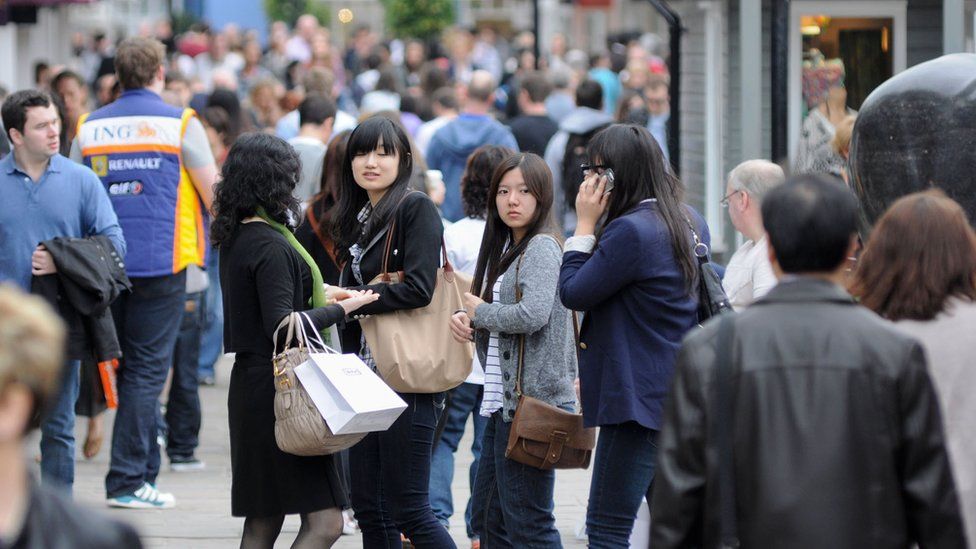
Chinese tourists who shop for luxury goods are motivated by "materialism, a desire for social status or to conform with others", and these differences in their nature influence not only what they buy, but where they buy, according to a recently published study by researchers at The Hong Kong Polytechnic University.
Mainland Chinese tourists visiting Hong Kong tend to visit different shopping outlets to buy luxury goods according to their different motivations, said Dr Sam Kim of the School of Hotel and Tourism Management (SHTM) at The Hong Kong Polytechnic University.
Shopping is a major driver of tourism worldwide, and cities such as Las Vegas, Dubai, Paris, London and Singapore have "all become destinations associated with shopping tourism", the researchers note. These destinations attract both regional and international shoppers - many tourists from Europe and the US "travel to Asia-Pacific shopping destinations", while tourists from the Asia-Pacific "also tend to arrange shopping tours to Europe and the United States". Destination marketers use shopping "as a tool with which to build a destination's brand equity" and enhance its competitiveness.
Shopping tourism benefits not just the national economy of such destinations, but also local communities, because while an upscale downtown shopping mall sells luxury international branded goods, rural farms and traditional craftspeople sell their homemade products directly to foreign tourists. Shopping, according to the researchers, provides huge economic benefits. For instance, in Hong Kong, one of the most renowned shopping destinations worldwide, more than 60% of the HK$359 billion income from tourism is spent on shopping.

In a more general sense, mainland Chinese tourists spend a particularly large proportion of their budget on shopping - over 70%, compared with only 20% for North American tourists. The researchers explain that "Chinese is a Confucian culture" that is "very prone to outrageous consumption", and the "visible signs of luxury are the major motivation to buy luxuries". Chinese tourists value social relationships and social status, and one way of achieving high status is through material possessions. Thus, many Chinese visit Hong Kong either to buy luxury goods in upscale retail outlets or to buy counterfeit luxury goods at local street markets. Shopping also offers these tourists "enjoyable experiential value during travel" and encourages return visits.
Recently, however, Hong Kong's reputation as a shopping heaven has been threatened by an apparent downturn in retail sales, suggesting that it may be losing its allure. Hence, the researchers aimed to examine mainland Chinese tourists' motivations and satisfaction and how different outlets for shopping "drive tourists' intentions to shop for luxuries" in Hong Kong.
The researchers conducted an online survey of mainland Chinese who had bought luxury brands during a trip to Hong Kong within the last year, attracting 314 usable responses. The respondents were mainly young adults with a high level of education (more than 80% had a postgraduate degree) and what the researchers describe as "good purchasing power". They had visited Hong Kong more than three times on average, and for about three and a half days per trip.
Apart from demographic information, the survey assessed the respondents' level of agreement with 17 statements about their motivations for shopping in Hong Kong. After analysing the data, the items were grouped into three factors reflecting "materialism", "desire for social status" and "conformity with others".
The materialism factor included items such as "If I could afford it, I would travel for shopping purposes more often in HK" and "Shopping in HK increases my value from the point of view of others". People who endorse these views "value possessions due to their cost, rather than the possessions' utility", argue the researchers.
The second factor, desire for social status, included items such as "Shopping in HK is a symbol of success and prestige" and "Shopping in HK means wealth". Shoppers who agree with these statements buy luxury products "to improve their self-esteem and social status", the researchers suggest.
In contrast, the conformity factor included statements such as "I want to shop in HK because my acquaintances have been shopping here". Respondents who endorse these views, the researchers, reason, are likely to buy luxury goods so that they will "be accepted by a particular social group".
The researchers then used the information on motivations together with information on "shopping experience satisfaction" and three types of retail outlets - markets, malls and shops - to analyse how these factors influence the intention to shop for luxury goods in Hong Kong.
Perhaps unsurprisingly, the tourists with a high sense of materialism had a high intention to shop for luxuries. However, this only seemed to be true for shopping in markets, not in shops. The researchers explain that this may be because "materialists are very concerned with costs" and they can "buy more for less" at markets, either by buying counterfeits or by bargaining for lower prices.
Those tourists with both high and low desires for conformity had high intentions to shop for luxuries, indicating that they "use luxuries to strengthen their interpersonal relationships". However, the relationship was only evident in shops, rather than in markets, which suggests that tourist shoppers driven by conformity tend to buy genuine goods that indicate their membership of a particular reference group.
The surveyed tourists who placed a great deal of importance on social status had higher intentions to shop for luxury goods, and again they are more likely to do so in shops rather than markets. Shops, the researchers explain, have higher status than markets because they are "selling originals whereas the markets are selling counterfeits or bargains".
Interestingly, however, satisfaction had a greater influence on intentions to shop in markets than in shops, which suggests that "shopping is all about interaction with locals". Indeed, the authors suggest that this finding reinforces "the conclusion that the absence of human relationships in malls is decreasing their importance as a tourism retail outlet".
The researchers conclude that luxury is an "intrinsic motivation" that provides shoppers with social standing and fulfils their need for conformity. Their findings provide tourism managers with a better understanding of the factors that motivate tourists to "shop for luxury items across different retail outlets". Tourists who are motivated by social status and conformity prefer to shop for luxury goods in shops, whereas those who are motivated by materialism prefer to shop in markets, where they enjoy bargaining for better prices and derive greater satisfaction from interacting with the locals.
Overall, though, the researchers argue that "conformity with others is the most important driver of tourist shoppers in HK". Yet they caution that the findings relate specifically to Chinese tourists, and further research is needed to explore whether the same results would be found in different cultures and destinations.